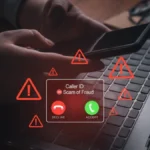In recent years, many people have received calls with an automated voice claiming they are in trouble with the law. These calls might say you owe money, are facing a lawsuit, or even that you’ll be arrested if you don’t act quickly. These types of calls are known as legal threat robocalls, and they are designed to scare you into handing over money or personal information. Understanding what these calls are, why they’re illegal, and how to recognize them can help you avoid falling victim to these scams. In this guide, we’ll walk you through everything you need to know about legal threat robocalls and provide tips to protect yourself.
What Is a Legal Threat Robocall?
A legal threat robocall is an automated phone call that falsely claims you are in some type of legal trouble. The call usually comes from a recorded voice, often posing as a lawyer, police officer, or government agency representative. The goal is to frighten you into acting quickly by paying money, sharing personal information, or calling a specific number to “clear up” a supposed legal issue. These robocalls are a form of fraud and are considered illegal in most places due to the deceptive and intimidating tactics they use to trick people.
How to Recognize a Legal Threat Robocall
Knowing how to identify a legal threat robocall is the first step in protecting yourself. Here are the main characteristics to watch out for:
- Urgency and Pressure: Scammers often use urgent language, saying you need to act immediately to avoid serious consequences.
- Demand for Payment or Information: The caller might ask for payment, credit card details, Social Security numbers, or other personal information.
- Caller ID Spoofing: Many robocalls use fake caller IDs to make it look like they’re from a local or familiar number, even though they’re not.
- Vague or Generic Messages: The recorded message often sounds non-specific, mentioning “legal action” or “lawsuit” without providing any real details about what you supposedly did wrong.
Common Types of Legal Threat Robocalls
Understanding the types of scams that commonly appear in legal threat robocalls can help you spot them more easily:
- IRS Impersonation Scams: The caller claims to be from the IRS, warning that you owe back taxes and will be arrested if you don’t pay immediately.
- Law Enforcement Scams: These calls pretend to be from the police, stating you’re under investigation and demanding payment or legal compliance.
- Debt Collection Scams: Here, the caller says you have unpaid debts and that legal action will follow if you don’t settle.
- Social Security Scams: In these, the caller claims your Social Security number is being misused and demands personal information to “clear up” the issue.
Why Legal Threat Robocalls Are Illegal
Legal threat robocalls violate laws designed to protect people from harassment and fraud. In the United States, both the Federal Trade Commission (FTC) and the Federal Communications Commission (FCC) have rules against such calls. The FTC protects consumers by enforcing rules against unfair or deceptive acts, including fraud calls. The FCC regulates telemarketing calls and has strict rules on using automated dialing systems to prevent abuse. Violating these regulations can result in significant fines and penalties for the caller.
Steps to Protect Yourself from Legal Threat Robocalls
Protecting yourself from these scams is essential to avoid financial loss and identity theft. Here are some practical steps to keep you safe:
- Do Not Answer Unknown Calls: If you receive a call from an unknown number, let it go to voicemail. Legitimate callers will usually leave a message.
- Verify the Caller: If you receive a call claiming to be from a legitimate organization, hang up and contact the agency directly using official contact information.
- Never Share Personal Information: Avoid giving out sensitive information over the phone, especially if the caller initiated the contact.
- Report Suspicious Calls: If you receive a scam call, report it to the FTC, FCC, or your local police department.
- Use Call-Blocking Apps: Many smartphone apps can block robocalls and spam, helping to reduce the number of unwanted calls you receive.
What to Do if You Fall Victim to a Legal Threat Robocall
If you have shared personal information or money with a robocall scam, here’s what you should do:
- Monitor Your Bank Accounts: Keep a close eye on your bank and credit card accounts for any unauthorized charges.
- Contact Your Bank: If you provided financial information, inform your bank immediately so they can help protect your accounts.
- Report the Incident: File a complaint with the FTC and inform local authorities to help prevent further scams.
- Change Important Passwords: If you shared sensitive data, update your passwords to secure your accounts from unauthorized access.
How to Report Legal Threat Robocalls
If you encounter a legal threat robocall, reporting it can help authorities tackle the issue. Here’s how you can report these calls:
- File a Complaint with the FTC: You can submit a complaint on the FTC’s website, which investigates fraud cases across the country.
- Report to the FCC: The FCC handles cases related to telecommunications and can act against companies that violate robocall laws.
- Local Law Enforcement: Notify your local police department if you feel threatened by a scam call. They can offer advice and may investigate.
Why Do Scammers Use Legal Threat Robocalls?
Scammers rely on the psychological effect of a legal threat to exploit people. For many, the fear of being sued or arrested creates enough pressure to make them act quickly without verifying the caller’s identity. These scams often target vulnerable individuals, including the elderly, who may not be familiar with digital safety practices.
Conclusion
Legal threat robocalls are a serious problem, designed to scare and manipulate people into giving away their hard-earned money or personal information. By understanding what these robocalls are, how to recognize them, and how to protect yourself, you can stay safe and help stop these scams from harming others. Always be cautious when answering unknown calls, and remember that legitimate agencies will never demand payment or personal information over the phone. Stay vigilant, report any suspicious calls, and protect yourself from robocall scams.


